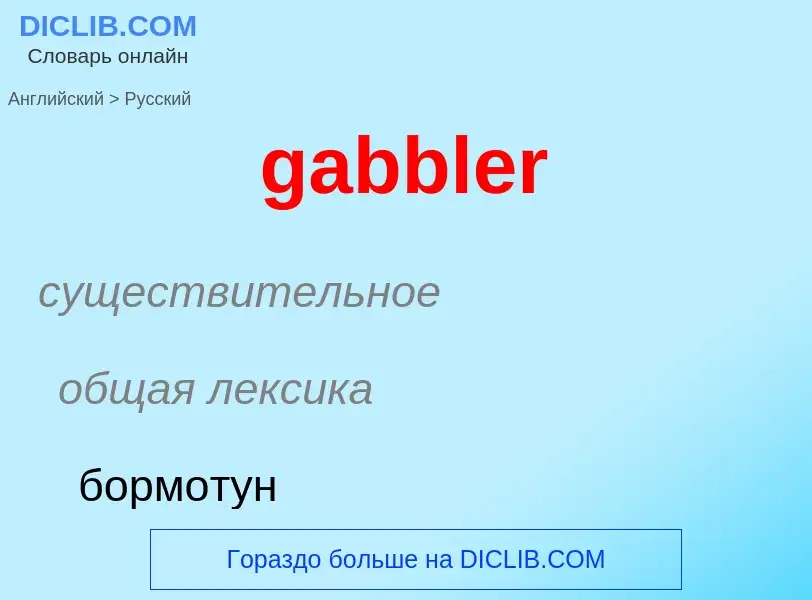Translation and analysis of words by ChatGPT artificial intelligence
On this page you can get a detailed analysis of a word or phrase, produced by the best artificial intelligence technology to date:
- how the word is used
- frequency of use
- it is used more often in oral or written speech
- word translation options
- usage examples (several phrases with translation)
- etymology
gabbler - translation to russian
существительное
общая лексика
бормотун
болтун
['gæb(ə)l]
общая лексика
кудахтать
гоготать
кудахтанье
гоготанье
существительное
['gæb(ə)l]
общая лексика
гоготанье (гусей)
кудахтанье (кур)
бормотание, бессвязная речь
разговорное выражение
бормотание
бессвязная
бессмысленная речь
сленг
трёп
трепотня
глагол
общая лексика
говорить нечленораздельно
произносить нечётко
бормотать
гоготать (о гусях)
кудахтать (о курах)
говорить неясно и быстро, бормотать
гоготать (о гусях)
разговорное выражение
говорить быстро и бестолково
тараторить
трещать
сленг
трепаться
Смотрите также
Definition
Wikipedia

Hedda Gabler (Norwegian pronunciation: [ˈhɛ̂dːɑ ˈɡɑ̀ːblər]) is a play written by Norwegian playwright Henrik Ibsen. The world premiere was staged on 31 January 1891 at the Residenztheater in Munich. Ibsen himself was in attendance, although he remained back-stage. The play has been canonized as a masterpiece within the genres of literary realism, nineteenth century theatre, and world drama. Ibsen mainly wrote realistic plays until his forays into modern drama. Hedda Gabler dramatizes the experiences of the title character, Hedda, the daughter of a general, who is trapped in a marriage and a house that she does not want. Overall, the title character for Hedda Gabler is considered one of the great dramatic roles in theater. The year following its publication, the play received negative feedback and reviews. Hedda Gabler has been described as a female variation of Hamlet.
Hedda's married name is Hedda Tesman; Gabler is her maiden name. On the subject of the title, Ibsen wrote: "My intention in giving it this name was to indicate that Hedda as a personality is to be regarded rather as her father's daughter than her husband's wife."



